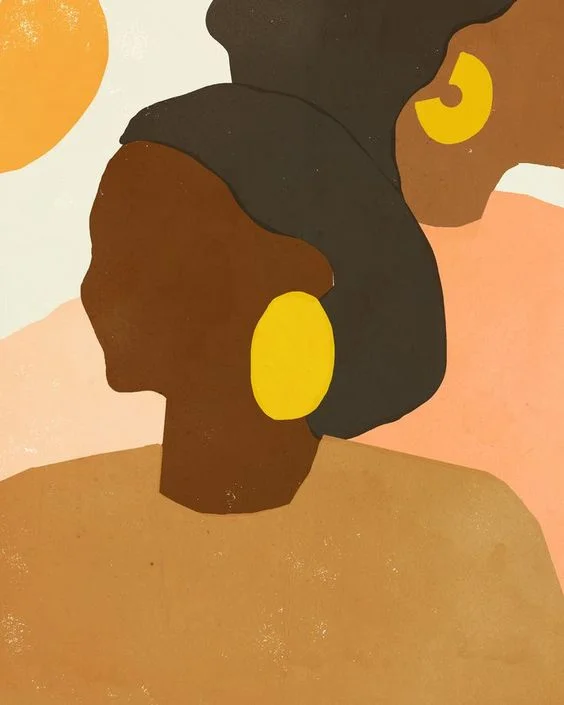The Best Self-Care Apps
Photograph of Dr. Gloria Joseph with Audre Lorde courtesy of Tagg Magazine
Before we embark on talking about apps, let’s remember the legacy of Audre Lorde and the original definition of self-care through her work. In 1988, the words of the black queer writer and activist outcried: “Caring for myself is not self-indulgence, it is self-preservation, and that is an act of political warfare.” Rather than conspicuous displays of self-care, caring for oneself was a rebellious act against the oppressive system signaling that you are worthy of it.
“Many of us are poor, many of us are working ourselves into early graves,” said the writer Evette Dionne, referring to black women, in an interview with Bitch magazine last year. “And so saying that I matter, that I come first, that what I need and what I want matters I think is a radical act because it goes against everything that we’ve been conditioned to believe.”
Self-care especially for BIPOC and marginalised groups is a necessity in dealing with the sadness, rage, and anxiety still caused by living in this oppressive world. It causes pain. And, in the words of Lorde, “Pain is important: how we evade it, how we succumb to it, how we deal with it, how we transcend it.' Self-care is a way for us to manage this pain.
Moving into the New Year, many of us—marginalised or not—resolve to either practise more self-care, reduce smartphone usage, or both. Remember that practising this does not and inherently should not need to involve commodities or things the Self-Care Industry tells us we must buy in order to practise it, whether a face mask or other single-use gewgaws you never thought you needed (because you don't). Blow a raspberry at those and scroll by them!
Despite the strained reputation of social media and the often-commodified state of self-care, these two resolutions do not have to be paradoxical or negative. Indeed, they can feed each other for more balance than isolated and even strained goals.
Here are our favourite, accessible apps for balanced phone usage and care:
Forest
This app performs precisely the aforementioned balance by boosting productivity by forcing you to unplug. If you manage not to check social media apps during the times you designate, Forest rewards you with “currency” that can be used to plant trees, both virtually and in real life. As of this article’s publishing, the app has sponsored over 371,000 tree plantings with Trees for the Future. You can find Forest & start planting trees via the App Store or Google Play.
plant nanny
Proper hydration may be another resolution or intention for you in the New Year. Even if not, most of us should be drinking more water. Plant Nanny is a, if we may say so, makes tracking hydration fun by linking your water intake to a virtual anthropomorphic plant, which grows as you hydrate. Find it on the App Store or Google Play.
Aloe Bud
This app is self-described as “an all-in-one, self-care pocket companion. It gently brings awareness to self-care activities, using encouraging push notifications, rather than guilt or shame.” If you’re trying to declutter your phone and would rather have just one app dedicated to self-care, this might be fitting for you. This app is not available on Android, but you can find it on the App Store.
Headspace
If, like me, investing in something financially is a way to keep yourself accountable, Headspace might be a good meditation app for you. The first 10 sessions are complementary, and subscribers have further access to an Headspace’s vastlibrary of meditation techniques and exercises. Find Headspace at the App Store or Google Play.
Insight
If you prefer not to pay for meditation or can hold yourself accountable without it, Insight is also a wonderful free option. It has and has an entire library of teachers. There are a variety of meditations, from chakra to sound baths. Find it on the App Store and Google Play.
Talkspace
Therapy for many is a necessity but also inaccessible, financially or environmentally. If you cannot afford therapy, do not have time for it, or do not live near a therapist, Talkspace might be an option for you. This app makes it easier to connect with an accredited therapist or counselor to support you. You can find Talkspace at the App Store or Google Play.
Or put your phone away and spend time with a loved one; sing or cry in the shower; pluck forgotten weeds or water your flowers; bake a cookie oh yes or even a cake; call your mother or father or grandparent, on the phone or in your heart; or maybe they’ve caused you pain, and in its remembrance, the print of their trauma swells within you . . . let it ooze out in your validation of your experiences, emotions, and where you are, often here and sometimes There but still here now and not lost in the nowhere.
About the Author
Almila Kakinc-Dodd is the Founder, Editor-in-Chief of The Thirlby. She is also the author of the book The Thirlby: A Field Guide to a Vibrant Mind, Body, & Soul. She is currently pursuing her Master’s in Nursing as a Dean’s Scholar at John’s Hopkins University. Her background is in Anthropology & Literature, which she has further enriched through her Integrative Health Practitioner training at Duke University. She lives in the Washington, D.C. Metro Area, where she regularly contributes to various publications & studying to pursue Nursing. She is a member of Democratic Socialists of America and urges others to join the movement.




